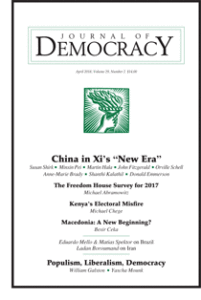
Credit: Wikipedia
Europe’s most dynamic political leader, Emmanuel Macron, pays a state visit to Washington this week. The French president has emerged as the West’s most formidable opponent of populist nationalism and a beacon for progressives hoping to find their way back to the halls of power across the democratic world, notes Will Marshall, president of the Progressive Policy Institute in Washington, D.C.
We see authoritarianism rising all around us,” Macron told the European Parliament last week. “The response should not be authoritarian democracy but the authority of democracy.”
A few years ago, Macron’s words might have seemed strange. The ascendence of democracy and the related liberal values was unquestioned in Europe and elsewhere in the west. Today, this statement is needed, the FT noted:
 At the periphery of the bloc, principles constitutive of the European project are under strain. In Hungary, Viktor Orban is pressuring the judiciary, the free press and non-governmental organisations. In Poland, the ruling Law and Justice party is locked in conflict with the EU over a proposed denuding of Polish courts’ independence. Elsewhere in Europe, similar strains are evident, if less pronounced. President Macron is right to take the threat seriously. Already, Poland and Hungary can protect each other from pressure in the European Council. If more countries drift away from liberalism the result would be even greater impunity for the anti-liberals.
At the periphery of the bloc, principles constitutive of the European project are under strain. In Hungary, Viktor Orban is pressuring the judiciary, the free press and non-governmental organisations. In Poland, the ruling Law and Justice party is locked in conflict with the EU over a proposed denuding of Polish courts’ independence. Elsewhere in Europe, similar strains are evident, if less pronounced. President Macron is right to take the threat seriously. Already, Poland and Hungary can protect each other from pressure in the European Council. If more countries drift away from liberalism the result would be even greater impunity for the anti-liberals.
The EU should get tough on its illiberal democracies, says the Economist.
 Across Western democracies, the populist/nationalist tide has submerged the old left-right axis and carved out new political fault lines based on education, ethnicity and geography; it pits an aging white working class—many of whom supported progressive parties in the past—and cultural traditionalists in the countryside against newcomers, cosmopolitan elites and the young, who feel at home in a borderless, multicultural world, PPI’s Marshall writes for POLITICO:
Across Western democracies, the populist/nationalist tide has submerged the old left-right axis and carved out new political fault lines based on education, ethnicity and geography; it pits an aging white working class—many of whom supported progressive parties in the past—and cultural traditionalists in the countryside against newcomers, cosmopolitan elites and the young, who feel at home in a borderless, multicultural world, PPI’s Marshall writes for POLITICO:
Macron understands the power of grand narratives in forging consensus in diverse, liberal societies. “Post-modernism was the worst thing that could have happened to our democracy,” he told Der Spiegel in October, “because it destroyed the idea of a convincing national myth, and with it the possibility of a feeling of national unity and purpose.”
“Macron’s inspirational narrative stresses a reinvigoration of his country’s republican principles, rooted in the liberal ethos of the European Enlightenment,” adds Marshall, a former board member of the National Endowment for Democracy., the Washington-based democracy assistance group.
 Macron remains committed to “an open and cooperative world order, “say French analysts Paul Zajac and Benjamin Haddad. But some observers say the French president’s sheen as a political prodigy and savior of European liberalism has been dulled by grinding rail strikes and sagging poll numbers.
Macron remains committed to “an open and cooperative world order, “say French analysts Paul Zajac and Benjamin Haddad. But some observers say the French president’s sheen as a political prodigy and savior of European liberalism has been dulled by grinding rail strikes and sagging poll numbers.
Have democratic states grown unresponsive to voters? Yascha Mounk argues in the latest issue of the Journal of Democracy that populism’s rise may, in part, reflect popular frustration with “undemocratic liberalism.”







